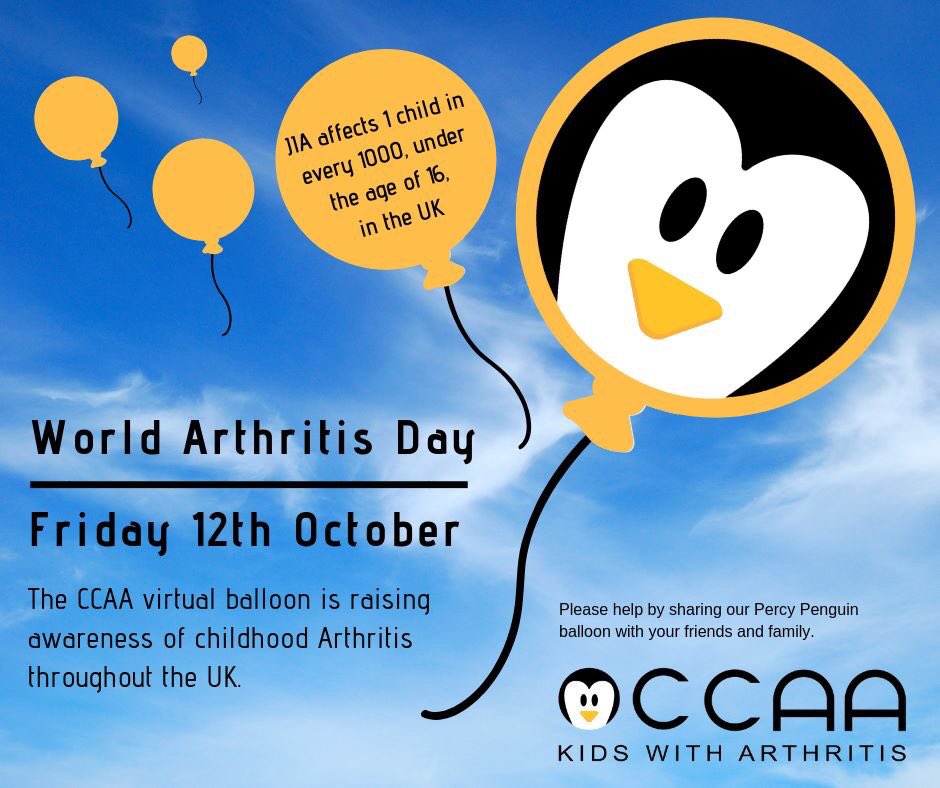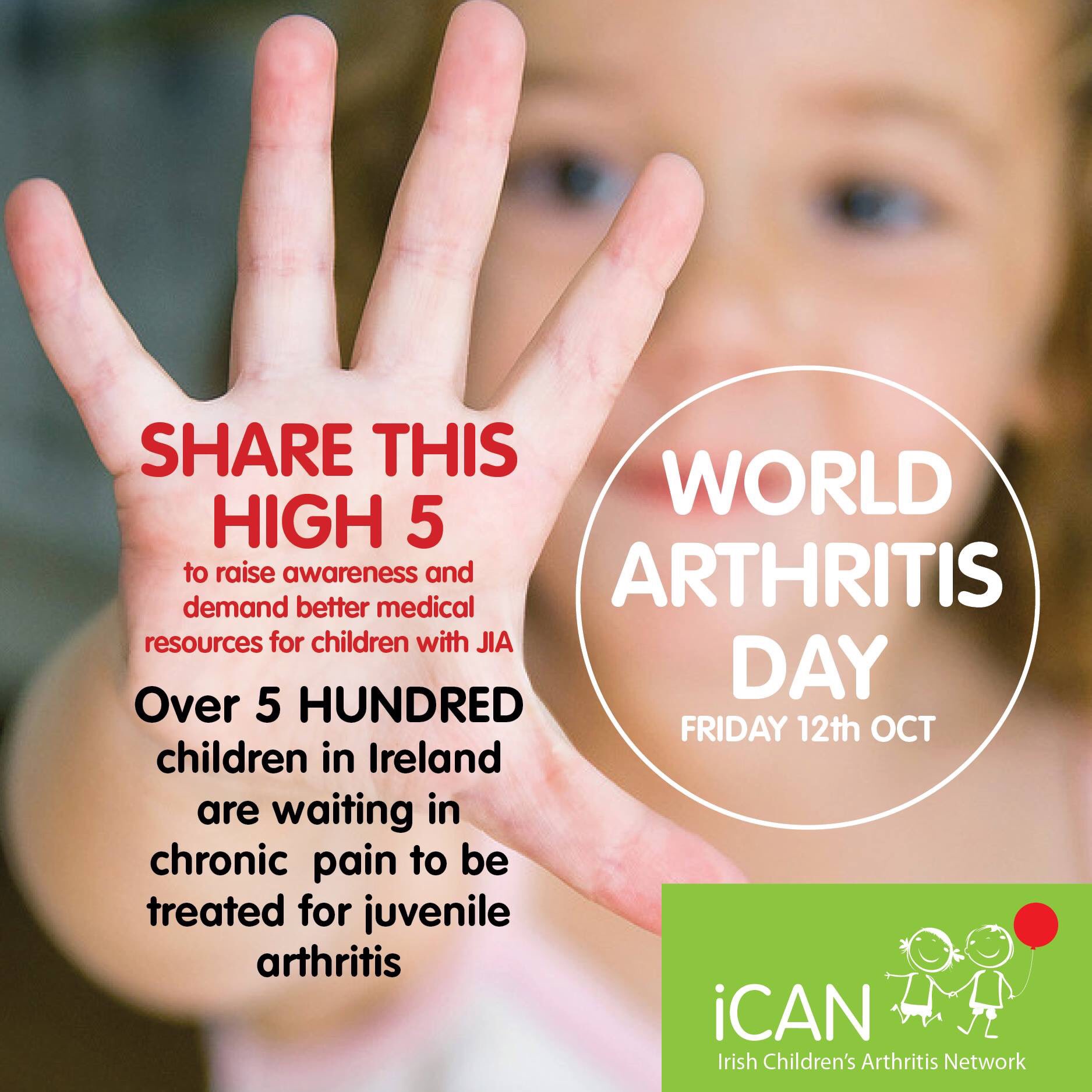Today is no ordinary day! Every year, on October 12th, people and communities from around the world unite to celebrate World Arthritis Day. World Arthritis Day (WAD for short) is a global awareness-raising day, which for the second time, is part of the European League Against Rheumatism’s ‘Don’t Delay, Connect Today!’ campaign.
The EULAR Campaign, Don’t Delay, Connect Today, was launched in 2017 and continues to enjoy an ever-increasing audience in Europe (and further afield) in 2018. Designed to raise and promote awareness of the symptoms connected to rheumatic and musculoskeletal diseases (RMDs) and the importance of gaining early diagnosis and access to care, the campaign embraces all three pillars of the European League Against Rheumatism (EULAR): People against rheumatism in Europe (PARE), health professionals and scientific societies. Check out some of the ‘Don’t Delay, Connect Today’ activities that have been
happening across Europe throughout 2017 and 2018.

The EULAR Campaign aims to raise awareness of the importance of early diagnosis in preventing further damage to those living with RMDs, encouraging timely access to evidence-based treatment. Take a look at the fantastic campaign video, filmed in 2017, featuring Kate, Aran and I, as we share our experiences and thoughts about the importance of early diagnosis and access to treatment:
[youtube https://www.youtube.com/watch?v=4S8fiTGL7wo?rel=0&showinfo=0&w=560&h=315]
Rheumatic and musculoskeletal diseases (RMDs) are now broadly recognised as one of the most challenging chronic conditions around the world, affecting a quarter of all people in Europe – that’s more than 120 million people. RMDs affect both men and women of all ages, including children and young people. However, some RMDs are more common amongst certain populations. For example, rheumatoid arthritis, scleroderma, fibromyalgia and lupus tend to affect more women. While spondyloarthropathies, such as ankylosing spondylitis, and gout tend to be more common in men.
People with RMDs often receive delayed or no diagnosis at all, leaving people at the hands of these painful and damaging conditions. Early diagnosis is key to preventing further damage, so that appropriate treatment can be given in a timely manner. The challenge in receiving a diagnosis is often due to a lack of awareness, reducing peoples’ quality of life.
What causes RMDs to develop?
In some cases, RMDs can be inherited; however, a family history of RMDs does not mean you will inevitably develop an RMD. Lifestyle factors can also play a role in the development of some RMDs, such as smoking, excessive weight, a sedentary lifestyle, increasing age and having occupations that lead to injury and overuse of joints and muscles. However in some cases, the causes are unknown.
Know the symptoms and act early
Knowing the symptoms and talking to a healthcare professional is the first step in managing any disease. RMDs are associated with a wide range of symptoms, including:
- Inflammation indicated by joint swelling, stiffness, redness, and/or warmth;
- Persistent muscle and joint pain;
- Tenderness;
- Extreme fatigue, lack of energy and feeling weak;
- Stiffness and restricted range in movement or flexibility;
- Joint deformity;
- Symptoms affecting the internal organs;
- Invisible symptoms, for example, depression and anxiety.
Achieving a rapid diagnosis is more likely to improve long-term outcomes
Quick action upon presentation of RMD symptoms is vital and symptoms should be assessed by a health professional, preferably a specialist rheumatologist, as early as possible to access appropriate treatment. Early medical treatment of inflammatory RMDs, particularly in the first 12 weeks, can prevent joint and organ damage, improving long-term outcomes, and the likelihood of achieving disease remission. Treatment choices should be a shared decision, made between the healthcare professional, the person with the condition and their family.
Treating and managing RMDs
Treatment for RMDs typically focuses on managing the condition to ensure the best possible quality of life. There is no single medication or treatment that works for everyone. However, there are treatments, including medication, that can help manage pain, as well as controlling RMD symptoms. Clinical remission, where the symptoms appear to cease, is an increasing possibility, thanks to newer treatments targeting the underlying disease processes.
Anxiety and depression in those with RMDs is about twice that seen in the general population, and often slips under the radar of health professionals. Therefore, it’s important for people with RMDs to tell health professionals how they are feeling, as psychological support can be extremely beneficial to help people cope with their condition.
In addition, self-management is an essential part of managing RMDs and can be life-changing. For people with RMDs, self-management means taking control of living with an RMD, encouraging an attitude whereby they accept the condition affects them but does not control them. These self-management skills have been identified as being crucial for emotional and physical wellbeing. This technique, combined with support from local support groups and patient organisations can help people manage their RMD, helping them to live their lives to their full.
There are even some surprising upsides to arthritis, would you believe it! I relate to so many of the points raised in that blog. Arthritis has shaped me into the person I am today – and despite all of the negatives along the way, I am so grateful for the lessons it has taught me… the person it has made me… and the life it has carved out for me.
So today, on World Arthritis Day, join in on raising awareness of these conditions. Whether you share a post on social media, talk to your neighbour about arthritis, or decide to fundraise for one of the many wonderful charities supporting people, please do your bit. Every single act will make a difference.
Dream big. Start small. Act now.”
Help to place the spotlight on how arthritis and other types of RMDs affect children and young people. Share CCAA’s Percy Penguin balloon and iCAN’s High 5 on social media – let’s see how far they can travel around the globe.
Don’t forget to include hashtags on your social media posts! #WorldArthritisDay #ConnectToday #WAD18 #WAD2018


For more information about World Arthritis Day, please visit:
http://worldarthritisday.org. The EULAR Campaign aims to raise awareness of the importance of early diagnosis in preventing further damage to those living with RMDs, encouraging timely access to evidence-based treatment. Take a look at the fantastic campaign video, filmed in 2017, featuring Kate, Aran and I, as we share our experiences and thoughts about the importance of early diagnosis and access to treatment:
[youtube https://www.youtube.com/watch?v=4S8fiTGL7wo?rel=0&showinfo=0&w=560&h=315]
Rheumatic and musculoskeletal diseases (RMDs) are now broadly recognised as one of the most challenging chronic conditions around the world, affecting a quarter of all people in Europe – that’s more than 120 million people. RMDs affect both men and women of all ages, including children and young people. However, some RMDs are more common amongst certain populations. For example, rheumatoid arthritis, scleroderma, fibromyalgia and lupus tend to affect more women. While spondyloarthropathies, such as ankylosing spondylitis, and gout tend to be more common in men.
People with RMDs often receive delayed or no diagnosis at all, leaving people at the hands of these painful and damaging conditions. Early diagnosis is key to preventing further damage, so that appropriate treatment can be given in a timely manner. The challenge in receiving a diagnosis is often due to a lack of awareness, reducing peoples’ quality of life.
The EULAR Campaign aims to raise awareness of the importance of early diagnosis in preventing further damage to those living with RMDs, encouraging timely access to evidence-based treatment. Take a look at the fantastic campaign video, filmed in 2017, featuring Kate, Aran and I, as we share our experiences and thoughts about the importance of early diagnosis and access to treatment:
[youtube https://www.youtube.com/watch?v=4S8fiTGL7wo?rel=0&showinfo=0&w=560&h=315]
Rheumatic and musculoskeletal diseases (RMDs) are now broadly recognised as one of the most challenging chronic conditions around the world, affecting a quarter of all people in Europe – that’s more than 120 million people. RMDs affect both men and women of all ages, including children and young people. However, some RMDs are more common amongst certain populations. For example, rheumatoid arthritis, scleroderma, fibromyalgia and lupus tend to affect more women. While spondyloarthropathies, such as ankylosing spondylitis, and gout tend to be more common in men.
People with RMDs often receive delayed or no diagnosis at all, leaving people at the hands of these painful and damaging conditions. Early diagnosis is key to preventing further damage, so that appropriate treatment can be given in a timely manner. The challenge in receiving a diagnosis is often due to a lack of awareness, reducing peoples’ quality of life.

 For more information about World Arthritis Day, please visit: http://worldarthritisday.org.
For more information about World Arthritis Day, please visit: http://worldarthritisday.org.
